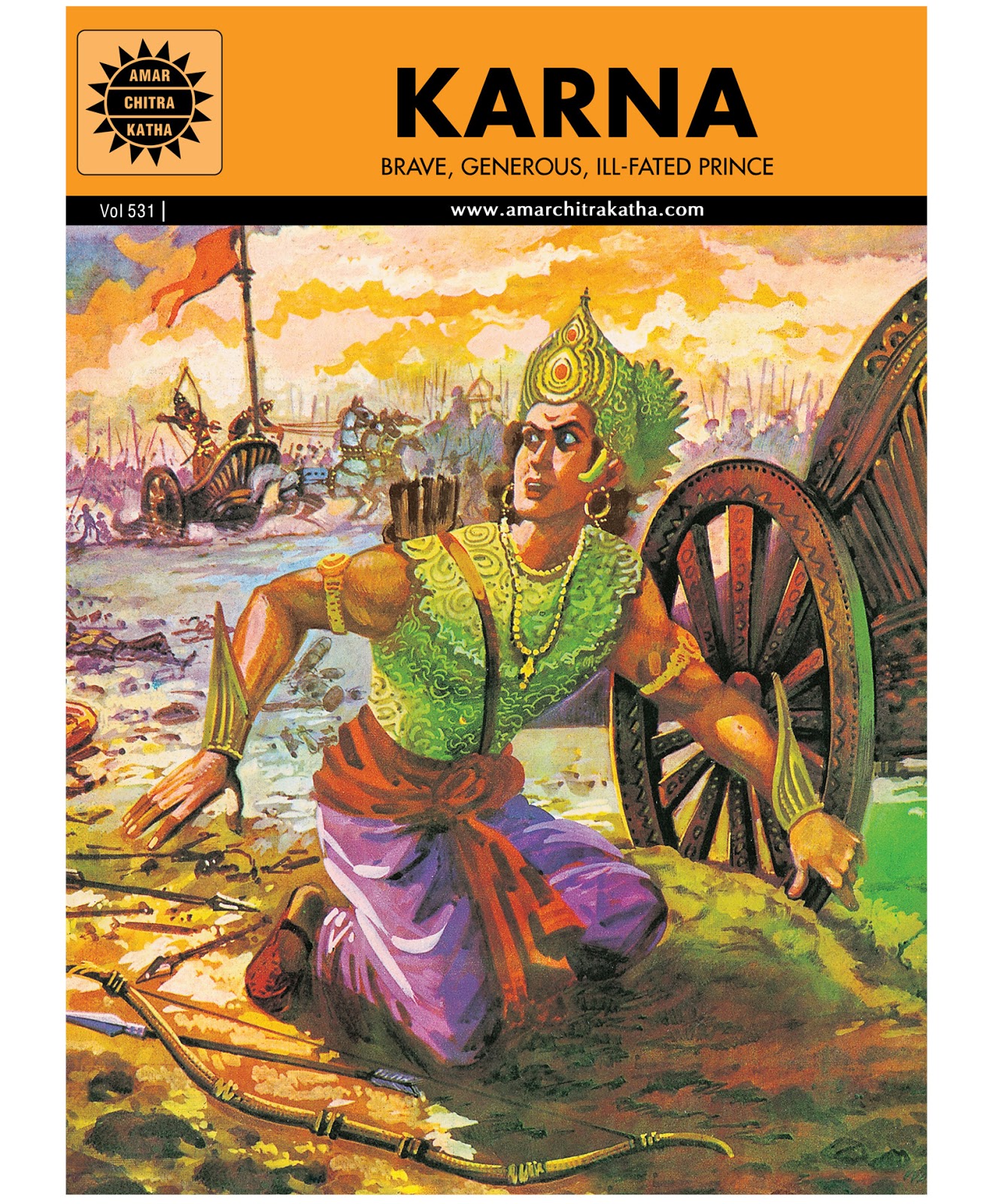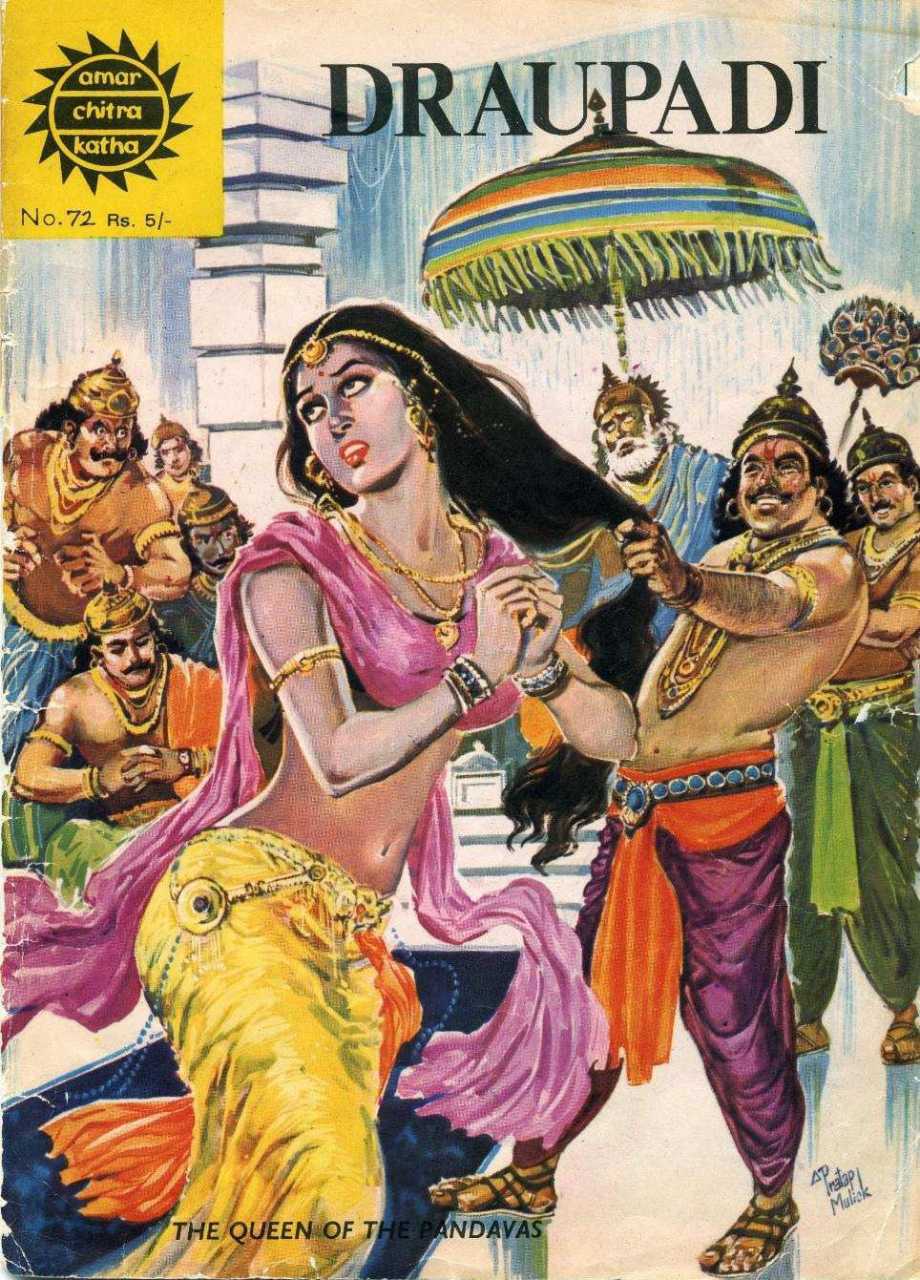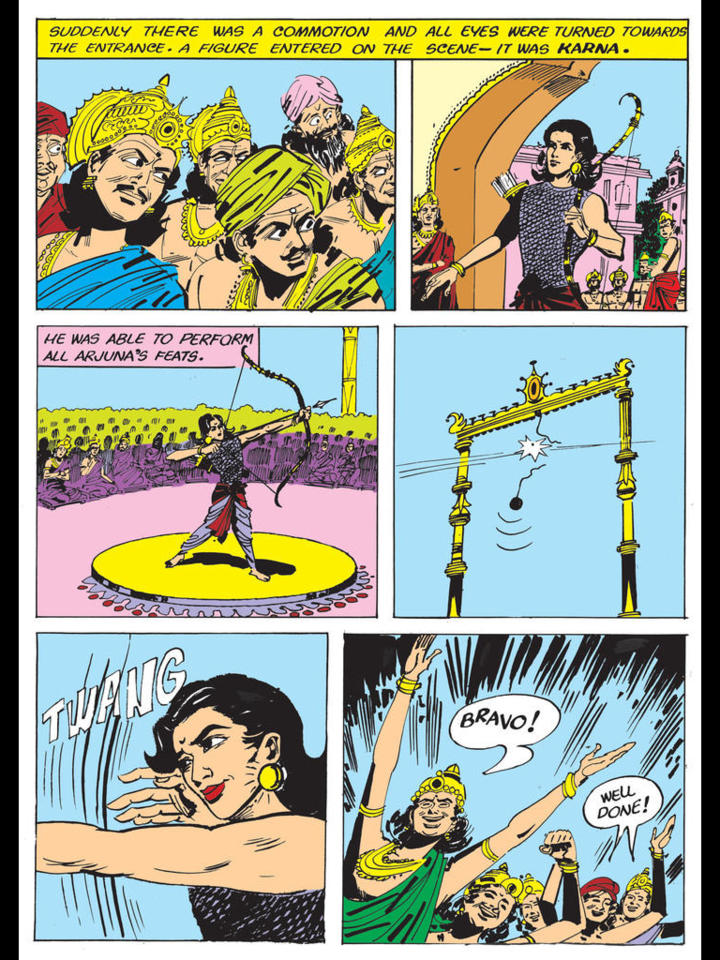Decoding Karna
One of my fondest memories from school was when we were split into different houses during my sixth grade. The selection process was, of course, random. Our “P.T.Sir” interrupted one of our classes with a huge bunch of colored banians, one for each of the four houses - Bhishma, Abhimanyu, Arjuna and Karna, and started distributing them on a round robin basis.
Secretly I was hoping to get into Karna house. From the stories I had read and heard at the time, Bhishma was old and venerable, Abhimanyu was killed unlawfully, Arjuna was the hero, and Karna was the victim of circumstance, the loyal friend and the symbol of generosity. Who wouldn’t want to be his fan? Don’t we all love the one who makes the ultimate sacrifice?
So it was with a wide grin that I ran up to him, as he pointed at me and handed over a dull, yellow banian with my school crest and “Karna” embossed on it in green.

For a long time I believed Karna to be a virtuous and courageous person, one who was equal in prowess to Arjuna himself, and whose largesse was unparalleled. Which was why it was quite a bitter pill to swallow when I started reading many different texts on the Mahabharatha, each of which deconstructed the image of Karna I had in my head, bit by bit.
Now, it is clear to me he was nothing close to the mental picture I had of him. Simply put, I went from “OK, he wasn’t THAT good”, to “Who is this guy?”
“What is this evidence you speak of?”, I hear your mental frowns.
The Bhandarkar Oriental Research Institute in Pune took up the task of compiling the acclaimed “critical edition” of the Mahabharatha, and presented a 19 volume edition to then president of India Dr.Sarvapalli Radhakrishnan in 1966. They are now in the process of translating the Devnagri scripts into English. It is this version I refer to in my humble arguments below, as it is considered to be the earliest version of the Mahabharatha available.
Let me first tackle the question of his valor vis-a-vis Arjuna. Karna and Arjuna were equals only in Karna’s head. Every instance they met in battle, Arjuna has come out not only victorious, but gave him a sound drubbing.
One of their earliest confrontation came when Arjuna, disguised as a Brahman, won Draupadi’s hand at her Swayamvara. The Kshatriyas assembled there were affronted that a Brahman won a Kshatriya princess and attacked Arjuna and Bhima. Karna was on the side of the Kshatriyas who were defeated, and he withdrew in between, citing, as an excuse, that he won’t skirmish with Brahmans.
The Battle of Virata reveals Arjuna’s superiority over the combined strength of the Kaurava warriors. In an exemplary display of skill, Arjuna single-handedly defeated them all, and even went on to rob them of their clothes, utterly humiliating them in the process. What chance did Karna stand against Arjuna in a one-on-one combat, if he couldn’t defeat him with stalwarts like Bhishma and Drona alongside him?
Then comes the showdown during the Kurukshetra war itself. Arjuna steadily gained the upper hand here too, breaking Karna’s armor and leaving him bleeding profusely. He managed to take off Arjuna’s coronet with a mis-hit arrow but couldn’t do much else. It was at this point his chariot wedged itself in the ground. Karna got down, warning Arjuna that it was against the code of conduct to strike an unarmed man.
Krishna wasted no time in reminding Arjuna of his opponent’s dishonorable acts - inciting the Kauravas to strip Draupadi and taking part in Abhimanyu’s unjust killing. An infuriated Arjuna struck another arrow, which as always, found its mark, ripping through Karna’s heart.
“But Arjuna cheated!”
What was Karna’s claim for a fair fight though? Was he really deserving of dharma? “As you sow, so shall you reap” seems apt here.
Karna’s moments of charity and loyalty (at times selfish), while admirable, are far outdone by his vile acts. While the Mahabharatha treads on this grey area of good vs evil of it’s characters, it is ultimately the position they take in key situations which determine their ends. Can we really celebrate Pablo Escobar as a hero, just because he gave back to his people of Medellin, while drug trafficking and assassinating innocent people elsewhere? The case of Karna, to me, is of a similar strain.
Take for instance, his incitement of Dushashana to disrobe Draupadi - “The wife of five husbands is no better than a strumpet. She and her husband are nothing but slaves now. Strip them of their finery.” Why would an outsider, not part of the family feud, involve himself in such a ghastly fashion? Was he, perhaps, trying to prove his loyalty to Duryodhana? Or was it simply a hatred for the Pandavas, and his own insecurity at being a low-born suta, thus unfit for Kshatriya way of life? Either way it seems very uncouth and crass to behave in such a way, unseemly of a man of honor.

And what of his complicity in killing Abhimanyu? Karna did not have one word of protest against attacking this sixteen year old trapped in the Chakravyuh formation, en masse. It is silly that he expected any better of Arjuna, whose son he killed mercilessly.
In spite of his depravity, certain acts of Karna still stand out. He staunchly refused to join forces with the Pandavas on Krishna’s request, by virtue of which he would have become a Kshatriya of the highest order. He did the same when Kunti revealed the history of his birth to him, standing steadfast in his support for Duryodhana, while being respectful to both of them. For someone who always longed to be a Kshatriya, this was a defining moment, where he accepted the sutas as his true family.
It is still unclear what part of his refusal to join the Pandavas was loyalty to Duryodhana. When the Gandharvas took Duryodhana prisoner, it was Arjuna and Bhima who rescued them on Yudhistra’s order, while Karna fleed from the scene.
Bhishma was furious when he came to know of this - “Those loyal to the king don’t live to ask whether the king is alive. How could you think of your own hide with the king in danger? Your much vaunted love for the king is nothing but a pretence.”
Karna also refused to fight in the war as long as Bhishma was commander-in-chief, as Bhishma didn’t enlist him as a “Maharathi”. This kept him out of the battleground for 9 days, days during which a skilled warrior like him could have caused plenty of damage.
He promised to Kunti that he won’t kill anyone but Arjuna. While on the surface this looks to be a generous gesture, it again show his contempt and overconfidence. He considered Arjuna his equal, and did not want to engage with the others, thus giving the rest a free pass. Would someone loyal to a friend, put his own interests and ego ahead of what is necessary for them to win the war? Duryodhana was indirectly handicapped due to Karna’s personal grudges.

Karna’s story is that of a dissatisfied man, troubled with his own identity, and enduring a lifelong contempt for his enemy, while trying to be loyal to a friend. It is said that when the Pandavas were displaying their skills after their training from Drona, Karna first made his appearance and challenged Arjuna for a duel after matching all his feats. While the elders assembled there refused him this opportunity based on his suta origins, he didn’t have anyone holding him back when he did get a chance to duel Arjuna during the war. And he failed, yet again, without ever truly finding an answer to who he really was.
Originally published here.